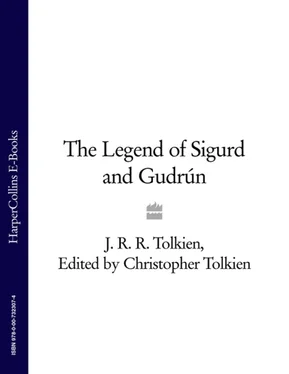J. Tolkien - The Legend of Sigurd and Gudrún
Здесь есть возможность читать онлайн «J. Tolkien - The Legend of Sigurd and Gudrún» — ознакомительный отрывок электронной книги совершенно бесплатно, а после прочтения отрывка купить полную версию. В некоторых случаях можно слушать аудио, скачать через торрент в формате fb2 и присутствует краткое содержание. Жанр: Старинная литература, на английском языке. Описание произведения, (предисловие) а так же отзывы посетителей доступны на портале библиотеки ЛибКат.
- Название:The Legend of Sigurd and Gudrún
- Автор:
- Жанр:
- Год:неизвестен
- ISBN:нет данных
- Рейтинг книги:5 / 5. Голосов: 1
-
Избранное:Добавить в избранное
- Отзывы:
-
Ваша оценка:
- 100
- 1
- 2
- 3
- 4
- 5
The Legend of Sigurd and Gudrún: краткое содержание, описание и аннотация
Предлагаем к чтению аннотацию, описание, краткое содержание или предисловие (зависит от того, что написал сам автор книги «The Legend of Sigurd and Gudrún»). Если вы не нашли необходимую информацию о книге — напишите в комментариях, мы постараемся отыскать её.
The Legend of Sigurd and Gudrún — читать онлайн ознакомительный отрывок
Ниже представлен текст книги, разбитый по страницам. Система сохранения места последней прочитанной страницы, позволяет с удобством читать онлайн бесплатно книгу «The Legend of Sigurd and Gudrún», без необходимости каждый раз заново искать на чём Вы остановились. Поставьте закладку, и сможете в любой момент перейти на страницу, на которой закончили чтение.
Интервал:
Закладка:
There is a curious absence of explanation of the reason why Sigurd must roast the heart. The real reason is of course that Sigurd must cook the heart so as to hear the birds. Fáfnismál supplies a not overwhelming but sufficient reason – ek mun sofa ganga [I shall go to sleep] (we may presume, after the potent draught of dragon’s blood) [39, 5–8, and 40]. Whether there ever was a better reason – connected with this remnant of very ancient belief, the eating of flesh and drinking of blood (of foes especially) to obtain their wisdom and power [40, 5–8; 46, 1–4] we perhaps can no longer say.
It may be noted that Snorri Sturluson says that Regin expressly proposed to Sigurd as terms of reconciliation for the slaying of Fáfnir, that he roast the heart for him.
39 Ridil: Old Norse Riðill , Regin’s sword; Snorri names it Refill.
42–44 In Fáfnismál there are seven stanzas ascribed (in a prose linking-passage) to the words of the birds (of a kind called igður , of uncertain meaning) chattering in the thicket, whose voices Sigurd could at once understand after the blood from the dragon’s heart touched his tongue; but these stanzas are in two different metres. The poem Fáfnismál is not in the verse-form fornyrðislag in which the greater number of the poems of the Edda are written, but in ljóðaháttr. In this metre the stanza falls into two halves of three lines each, of which the third line in each half usually has three stressed elements and double (or treble) alliteration within itself. Only three of the ‘bird-verses’ are in ljóðaháttr , the others being in fornyrðislag ; and my father argued forcefully and in detail that the fornyrðislag verses come from another poem (see further the note to 49–54).
The three ljóðaháttr verses, he held, are spoken by two birds, with two main motives selected : gold, fear of treachery, and gold repeated. This is the basis for these three stanzas in the Lay (though the suggestion in 42, 5–6 that Sigurd should eat Fáfnir’s heart himself is introduced from one of the other verses); but – rather oddly – they are cast in ljóðaháttr , thus apparently marking them out as intrusive, since the Lay is in fornyrðislag .
To illustrate the form as it appears in Old Norse I give here the first of the three ljóðaháttr verses with a close translation:
Höfði skemra láti hann inn hára þul
Fara til heljar heðan!
Öllu gulli þá kná hann einn ráða,
fjölð, því er und Fáfni lá.
(Shorter by a head, / let him send the grey-haired wizard / hence to hell! All the gold / then can he possess alone, / the wealth, that under Fáfnir lay.)
46–48 In the Saga Sigurd ate some only of the dragon’s heart, and some he set aside. The purpose of this is seen later in the saga, where it is told that at some time after the wedding of Sigurd and Gudrún ‘Sigurd gave Gudrún some of Fáfnir’s heart to eat, and thereafter she was far more grim than before, and wiser also.’ This element is excluded from the Lay; my father considered it ‘a late piece of machinery to explain Gudrún’s tangled psychology.’
These verses derive from a prose passage in Fáfnismál , closely similar to that in the Saga, which tells that after the death of Regin Sigurd rode on Grani following the tracks of Fáfnir to his lair, which was standing open. The doors and door-posts were of iron, as were all the beams of the house, which was dug down into the earth (46). Sigurd found there a vast store of gold and filled two great chests with it; he took the Helm of Terror and a golden mailcoat and many other precious things, and he loaded them onto Grani; but the horse would not move until Sigurd leaped upon his back.
49 ‘their wit he knew not’: this very unusual use of the word ‘wit’ seems in the context to be equivalent to ‘meaning’, ‘signification’.
49–54 In Fáfnismàl , after Sigurd has slain Regin and eaten the dragon’s heart he hears the igður again; and these five verses are again in fornyrðislag (see the note to 42–44). There is no indication of how many birds spoke, but the first two verses concern Gudrún, and the last three concern a Valkyrie on the mount of Hindarfell, surrounded by fire, sleeping: Ódin stabbed her with the thorn, for she had felled a warrior against his command. See the note on 54 below.
My father held that these verses, like the previous ‘bird-verses’ in fornyrðislag, came from a poem ‘which enlarged on the situation, and probably attempted through the bird-tradition to tell more of the tale’- a trace of a poem that attempted ‘to compress a great deal of the story into one situation.’ While accepting that ‘it is useless to discuss which bird says what’, he thought the guess that one bird speaks the verses concerning Gudrún and a second those about the Valkyrie ‘as good as any’.
In the Lay he did however retain this second group of ‘bird-verses’ (or more accurately, composed verses that echo their meaning), and gave them to a raven (those about the Valkyrie) and a finch (those about Gudrún), and interlaced them. But he displaced them to follow Sigurd’s entry into Fáfnir’s lair and his loading Grani with the treasure that he found there, so that these birds are speaking of things that may lie ahead for Sigurd as he rides away from Gnitaheiði; whereas in Fáfnismál the prose passage cited in the note to 46–48 follows the second group of ‘bird-verses’.
54 ‘her power wielding, / victory swaying as Valkyrie’. In northern legend and poetry the course and outcome of battles was governed by Valkyries, demonic warrior-women sent out as emissaries of Ódin.
The word Valkyrja means ‘chooser of the slain’: it is given to them to determine who is to die, and to award victory. Perhaps the most striking example of this conception is found in the Hákonarmál, a poem composed in the tenth century on the death of King Hákon the Good of Norway, son of King Harald Fairhair. The poem opens thus:
Göndul and Skögul Gautatýr sent
to choose who of kings of Yngvi’s race
should go to Ódin and dwell in Valhöll.
Göndul and Skögul are Valkyries; Gautatýr is a name of Ódin. In the poem King Hákon is pictured sitting on the ground with his shield rent and his mailshirt gashed, listening to the words of the Valkyries.
Then said Göndul, as she leant on the shaft of her spear,
‘Now will the might of the Gods grow greater,
since they have summoned Hákon with a great host
to their dwellings.’
The king heard what the Valkyries were saying
as they sat on their horses, thoughtful their
countenance,
with helms on their heads and their shields held
before them.
Then Hákon speaks to the Valkyrie named Skögul:
‘Why have you decided the battle thus, Geirskögul?
We have deserved victory of the Gods.’
‘We have brought it about,’ said Skögul, ‘that you
have held the field, and your foes have fled
away.
Now we must ride to the green homes of the Gods, to tell to Ódin that a mighty king is coming to him.’
VI BRYNHILDR
In the note to V. 46–48 I have given the content of the prose passage provided in the Codex Regius describing how Sigurd entered Fáfnir’s lair and took from it the great treasure of gold, which he loaded in chests on his horse Grani. This passage is treated in editions of the Edda as the conclusion of the poem Fáfnismál ; but in fact it continues without break or new title into the story of Sigurd’s encounter with the Valkyrie asleep on Hindarfell, and this part is treated as the prose introduction to a strange work to which the name Sigrdrífumál is given.
Читать дальшеИнтервал:
Закладка:
Похожие книги на «The Legend of Sigurd and Gudrún»
Представляем Вашему вниманию похожие книги на «The Legend of Sigurd and Gudrún» списком для выбора. Мы отобрали схожую по названию и смыслу литературу в надежде предоставить читателям больше вариантов отыскать новые, интересные, ещё непрочитанные произведения.
Обсуждение, отзывы о книге «The Legend of Sigurd and Gudrún» и просто собственные мнения читателей. Оставьте ваши комментарии, напишите, что Вы думаете о произведении, его смысле или главных героях. Укажите что конкретно понравилось, а что нет, и почему Вы так считаете.












